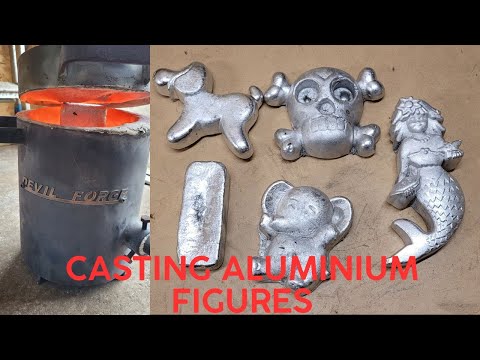The 5-Second Trick For Alcast Company
The 5-Second Trick For Alcast Company
Blog Article
Fascination About Alcast Company
Table of ContentsThe Best Guide To Alcast CompanyMore About Alcast CompanyNot known Factual Statements About Alcast Company Excitement About Alcast CompanyEverything about Alcast CompanyAlcast Company Fundamentals Explained
Chemical Contrast of Cast Aluminum Alloys Silicon advertises castability by reducing the alloy's melting temperature level and enhancing fluidness throughout spreading. Furthermore, silicon adds to the alloy's strength and use resistance, making it useful in applications where toughness is critical, such as automobile components and engine elements.It also boosts the machinability of the alloy, making it easier to refine into finished products. By doing this, iron adds to the general workability of light weight aluminum alloys. Copper enhances electric conductivity, making it beneficial in electric applications. It likewise boosts corrosion resistance and adds to the alloy's total toughness.
Manganese contributes to the toughness of aluminum alloys and enhances workability. Magnesium is a lightweight aspect that provides stamina and effect resistance to aluminum alloys.
The Facts About Alcast Company Uncovered
It allows the manufacturing of lightweight components with exceptional mechanical properties. Zinc improves the castability of light weight aluminum alloys and helps manage the solidification procedure throughout casting. It improves the alloy's strength and firmness. It is frequently located in applications where complex shapes and fine information are necessary, such as attractive castings and particular auto components.

The main thermal conductivity, tensile strength, return strength, and elongation differ. Select suitable basic materials according to the performance of the target product generated. Amongst the above alloys, A356 has the highest possible thermal conductivity, and A380 and ADC12 have the least expensive. The tensile limitation is the opposite. A360 has the most effective yield strength and the highest prolongation price.
Alcast Company - Truths

In accuracy spreading, 6063 is well-suited for applications where complex geometries and high-quality surface finishes are vital. Examples include telecommunication enclosures, where the alloy's superior formability permits smooth and cosmetically pleasing designs while keeping architectural honesty. In the Illumination Solutions sector, precision-cast 6063 components create elegant and reliable lighting fixtures that call for elaborate forms and great thermal efficiency.
It brings about a better surface area coating and much better deterioration resistance in A360. The A360 shows remarkable elongation, making it perfect for facility and thin-walled elements. In precision spreading applications, A360 is well-suited for sectors such as Consumer Electronics, Telecommunication, and Power Devices. Its boosted fluidness permits for intricate, high-precision parts like smartphone cases and interaction device real estates.
The Best Guide To Alcast Company
Its one-of-a-kind residential or commercial properties make A360 a valuable choice for accuracy spreading in these sectors, enhancing product durability and high quality. Light weight aluminum alloy 380, or A380, is an extensively utilized casting alloy with numerous unique characteristics. It provides superb castability, making it a suitable choice for accuracy casting. A380 shows great fluidity when molten, guaranteeing elaborate and thorough molds are precisely reproduced.
In precision casting, light weight aluminum 413 shines in the Consumer Electronics and Power Equipment markets. It's typically utilized to craft complex parts like mobile phone housings, camera bodies, and power tool casings. Its precision is impressive, with limited tolerances as much as 0.01 mm, making sure remarkable item setting up. This alloy's remarkable deterioration resistance makes it an excellent choice for exterior applications, making certain resilient, sturdy items in the stated markets.
The Buzz on Alcast Company
As soon as you have chosen that the aluminum die casting procedure appropriates for your task, an important following step view it now is choosing the most proper alloy. The aluminum alloy you select will substantially influence both the spreading process and the residential or commercial properties of the end product. Due to this, you must make your choice carefully and take an enlightened approach.
Determining one of the most suitable aluminum alloy for your application will imply evaluating a wide variety of attributes. These relative alloy qualities follow the North American Die Casting Organization's guidelines, and we've split them into 2 groups. The first category addresses alloy characteristics that impact the manufacturing process. The second covers qualities impacting the buildings of the end product.
The Main Principles Of Alcast Company
The alloy you choose for die spreading straight impacts several facets of the spreading process, like just how simple the alloy is to function with and if it is susceptible to casting defects. Warm breaking, additionally known as solidification fracturing, is a regular die casting problem for aluminum alloys that can lead to internal or surface-level tears or splits.
Certain light weight aluminum alloys are a lot more vulnerable to warm cracking than others, and your choice should consider this. It can damage both the cast and the die, so you need to look for alloys with high anti-soldering residential or commercial properties.
Deterioration resistance, which is already a remarkable feature of light weight aluminum, can vary considerably from alloy to alloy and is an essential characteristic to take into consideration depending on the environmental problems your item will certainly be revealed to (aluminum foundry). Put on resistance is another residential or commercial property frequently looked for in aluminum products and can differentiate some alloys
Report this page